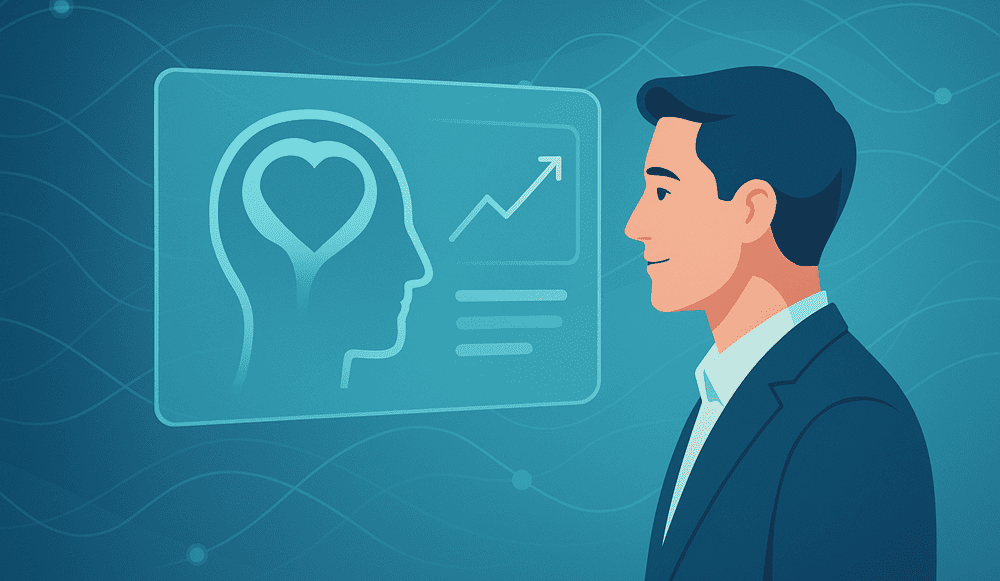Emotional intelligence (EQ) has become one of the most essential leadership skills in today’s workplace. While technical skills and business knowledge remain important, the ability to recognize, manage, and respond to emotions—both one’s own and others’—is what defines exceptional leaders.
As organizations grow more complex and hybrid work expands, companies are now turning to AI for emotional intelligence as a scalable, data-informed way to develop empathetic, self-aware, and effective leaders.
Why Emotional Intelligence Matters in Modern Leadership
The World Economic Forum’s Future of Jobs Report 2025 lists emotional intelligence as one of the top skills leaders must master. Teams led by emotionally intelligent managers report 20% higher engagement and 30% better retention rates, according to Gallup research.
Unlike IQ, which stabilizes early in life, EQ can be strengthened with the right feedback and training. That’s where AI is starting to play a transformative role.
Traditional leadership programs rely on workshops or occasional coaching. However, AI for emotional intelligence brings personalization and real-time feedback into the process—helping leaders practice empathy, communication, and self-awareness every day.
How AI Enhances Emotional Intelligence Development
AI doesn’t teach emotions—it supports humans in understanding and improving them. Here’s how:
| Area | AI Capability | Leadership Benefit |
| Emotion detection | Sentiment and tone analysis | Helps leaders reflect on how they communicate |
| Personalized feedback | Data-driven suggestions | Enables consistent behavioral improvement |
| Scenario simulation | AI-based role play and feedback | Builds empathy and better decision-making |
| Progress tracking | Dashboards and reports | Measures growth over time |
These applications go far beyond classroom learning. Leaders can now receive AI-based cues, such as “Your tone may sound dismissive,” or “Your feedback leaned too heavily on critique—try adding recognition.” Small nudges like these help internalize better habits over time.
This is where empathy training AI becomes particularly valuable—it gives leaders consistent micro-feedback loops that accelerate skill development.
The Role of Empathy and Awareness in Leadership Growth
Empathy is the foundation of emotional intelligence. But even well-meaning leaders can miss subtle cues—especially in digital interactions.
Through social awareness AI, technology can assess conversation dynamics and alert leaders when their tone may come across as impatient or distant. This is not about surveillance—it’s about reflection. AI helps leaders see themselves as others do, a key step in empathy growth.
Platforms that combine emotional coaching AI with contextual data (emails, calls, chat interactions) are already helping leaders gain self-awareness and adapt to different team needs. For example, an AI-driven assistant might summarize how a leader’s communication has shifted from “directive” to “collaborative” over a three-month period, highlighting measurable growth.
This ties closely with leader resilience coaching, where awareness and adaptability become tools for maintaining emotional balance under stress.
How AI Is Transforming Leadership Development Programs
Many organizations are redesigning their leadership pathways using leadership development AI. Instead of relying solely on classroom sessions, AI tools now analyze behavior, communication tone, and emotional reactions to simulate real-world leadership challenges.
These programs can:
- Deliver on-demand learning modules adapted to each leader’s style.
- Offer real-time feedback through virtual coaching bots.
- Track emotional growth through AI-powered wellbeing dashboards.
- Provide private reflection spaces for leaders to analyze their behavior trends.
For instance, a global consulting firm recently implemented AI-led coaching that provided managers with weekly emotional insight reports. Within six months, their internal engagement scores increased by 17%, and employee sentiment improved significantly.
This progress was measurable through employee sentiment AI, which monitored communication tone and peer feedback data in anonymized form.
Improving Communication Through AI Support
Leaders succeed or fail largely on communication. AI tools now help refine these skills using communication enhancement AI models that can interpret tone, empathy, and clarity.
A few practical applications include:
- AI assistants that evaluate speech rhythm and suggest pauses for clarity.
- Email writing tools that identify emotionally cold language and recommend warmer phrasing.
- Real-time feedback during presentations, helping leaders balance authority with approachability.
Such innovations can also enrich the onboarding experience, helping new leaders develop relational intelligence faster in hybrid environments.
From Data to Development: AI as a Leadership Partner
AI provides leaders with actionable insights rather than judgment. Think of it as a data-informed mirror: it reflects patterns you might miss and helps you refine your response.
For instance, after a tense meeting, AI tools can analyze group sentiment and show how a manager’s tone or pacing affected the room. This insight leads to more mindful communication next time.
Organizations using people management AI powered workplace wellbeing platforms are starting to report tangible business benefits:
- 25% reduction in team conflicts
- 19% improvement in feedback quality
- 12% faster resolution of interpersonal issues
Such data demonstrates how emotional intelligence, supported by AI, drives measurable outcomes in both culture and performance.
Integrating AI with Organizational Wellbeing
Developing emotionally intelligent leaders benefits not just individuals—but entire cultures. When AI tools support EQ growth, they indirectly strengthen engagement, trust, and collaboration.
This creates synergy with corporate wellbeing AI initiatives that focus on mental health, inclusivity, and psychological safety. Emotional intelligence training becomes part of a larger wellbeing ecosystem.
Moreover, when paired with workplace mindfulness, leaders can receive reminders for short breathing breaks or reflective check-ins, helping them regulate emotions and maintain focus during high-pressure situations.
Ethical Use and Human Oversight
While AI can accelerate learning, emotional intelligence is deeply human. Organizations must ensure transparency and privacy. Leaders should understand how emotional data is collected, anonymized, and used.
Companies using AI for emotional intelligence should follow clear ethical guidelines:
- Always inform users when feedback is AI-generated.
- Use aggregated data for team insights, not individual monitoring.
- Balance AI analytics with human coaching and mentoring.
When implemented responsibly, AI amplifies self-awareness instead of replacing human connection.
Real-World Example: AI-Driven Emotional Coaching in Action
Consider a Fortune 500 company that adopted emotional coaching AI to help mid-level managers improve feedback quality. Each week, AI reviewed written communication and offered private suggestions such as, “Add acknowledgment before critique” or “Your tone in this message might sound abrupt.”
After three months:
- Peer trust scores rose by 14%
- 1:1 meeting feedback improved by 22%
- Voluntary attrition dropped by 6%
Such results show that emotional growth can be accelerated when data meets human reflection.
Final Thoughts
Emotional intelligence isn’t just a leadership skill—it’s the foundation of trust, engagement, and innovation. With AI for emotional intelligence, companies can turn leadership development from an annual workshop into a daily practice.
From empathy training ai and social awareness ai to communication enhancement ai and people management ai, today’s tools make it possible to grow emotional capability at scale—while keeping the human at the centre.
Integrating these systems alongside leader resilience coaching, corporate wellbeing, and workplace mindfulness builds a stronger emotional culture across the organization. Ultimately, AI doesn’t make leaders more human—it helps them act more human, more often.







